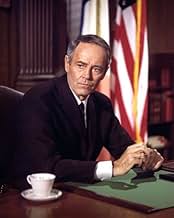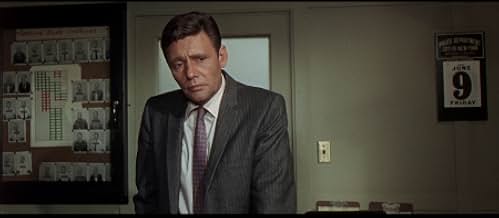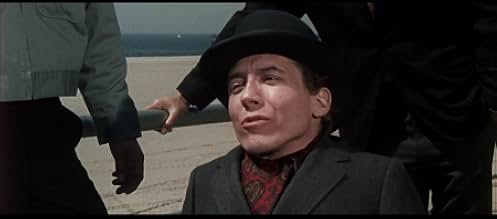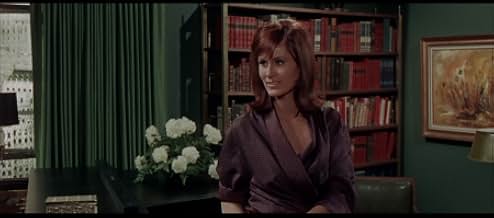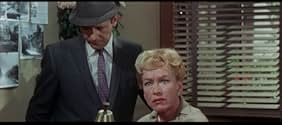IMDb RATING
6.5/10
4.3K
YOUR RATING
In New York City's Spanish Harlem, detectives Madigan and Bonaro are given 72 hours by their superior to capture a hoodlum wanted for homicide in Brooklyn.In New York City's Spanish Harlem, detectives Madigan and Bonaro are given 72 hours by their superior to capture a hoodlum wanted for homicide in Brooklyn.In New York City's Spanish Harlem, detectives Madigan and Bonaro are given 72 hours by their superior to capture a hoodlum wanted for homicide in Brooklyn.
- Director
- Writers
- Stars
- Director
- Writers
- All cast & crew
- Production, box office & more at IMDbPro
Featured reviews
Madigan is directed by Don Siegel and adapted to screenplay by Abraham Polonsky and Howard Rodman from the novel The Commissioner written by Richard Dougherty. It stars Richard Widmark, Henry Fonda, Inger Stevens, Susan Clark, Harry Guardino and James Whitmore. Music is scored by Don Costa and cinematography by Russell Metty.
Plot finds Widmark as Detective Daniel Madigan, who along with his partner Rocco Bonaro (Guardino), loses a suspected murderer who also makes off with their guns. Causing embarrassment to Police Commissioner Anthony Russell (Fonda), who is hardly a fan of Madigan's methods, they are given 72 hours in which to locate the escapee and bring him in. But as the two men go in search of the crim, Commissioner Russell has various other problems to address, both at work and with matters of the heart. Last thing he needs is a volatile Madigan screwing things up...
Based on a book called The Commissioner, a film originally titled the same, and the most interesting story thread in the picture is that of Henry Fonda's Commissioner! Then why is the film called Madigan, who is an interesting character that really is only second fiddle in this particular Don Siegel orchestra? It is one of the odd and frustrating things about the piece, the story is complex enough without being unsure who to focus on, a shame because Widmark, Clark, Fonda and Whitmore are doing sterling work for their under pressure director (Siegel was constantly fighting with producer Frank P. Rosenberg).
The themes at play are deliciously enticing, infidelity, police corruption, family strife, friendship, loneliness and identity etc etc, threads are dangled and given thoughtful dialogue passages. But hang on! Wasn't there a murderer on the loose at the beginning of the film? Half way through the piece I had forgotten about Steve Ihnat's crim that opened up proceedings, surely that can't be right? Film looks terrific at day time, though, where Metty's bold Technicolor photography really gives the New York locations a sense of 70s wonder (I know it's a 60s movie but it feels very 70s, and in a good way as well), though Costa's score is far too blunderbuss for narrative themes.
It's a mixed bag, a film you just know should be better considering the talent in front of and behind the cameras. Ideas at core are strong and worthy of filmic adaptation, while the last quarter is electrifying and crowned by a classic foray into film noir territory. But really this is recommended as just above average entertainment for the cop/crime movie fan. 6/10
Plot finds Widmark as Detective Daniel Madigan, who along with his partner Rocco Bonaro (Guardino), loses a suspected murderer who also makes off with their guns. Causing embarrassment to Police Commissioner Anthony Russell (Fonda), who is hardly a fan of Madigan's methods, they are given 72 hours in which to locate the escapee and bring him in. But as the two men go in search of the crim, Commissioner Russell has various other problems to address, both at work and with matters of the heart. Last thing he needs is a volatile Madigan screwing things up...
Based on a book called The Commissioner, a film originally titled the same, and the most interesting story thread in the picture is that of Henry Fonda's Commissioner! Then why is the film called Madigan, who is an interesting character that really is only second fiddle in this particular Don Siegel orchestra? It is one of the odd and frustrating things about the piece, the story is complex enough without being unsure who to focus on, a shame because Widmark, Clark, Fonda and Whitmore are doing sterling work for their under pressure director (Siegel was constantly fighting with producer Frank P. Rosenberg).
The themes at play are deliciously enticing, infidelity, police corruption, family strife, friendship, loneliness and identity etc etc, threads are dangled and given thoughtful dialogue passages. But hang on! Wasn't there a murderer on the loose at the beginning of the film? Half way through the piece I had forgotten about Steve Ihnat's crim that opened up proceedings, surely that can't be right? Film looks terrific at day time, though, where Metty's bold Technicolor photography really gives the New York locations a sense of 70s wonder (I know it's a 60s movie but it feels very 70s, and in a good way as well), though Costa's score is far too blunderbuss for narrative themes.
It's a mixed bag, a film you just know should be better considering the talent in front of and behind the cameras. Ideas at core are strong and worthy of filmic adaptation, while the last quarter is electrifying and crowned by a classic foray into film noir territory. But really this is recommended as just above average entertainment for the cop/crime movie fan. 6/10
This is a very good film--full of excellent acting and a pretty interesting story. Richard Widmark and Henry Fonda are both wonderful actors in the movie and their stories run parallel during most of the film--having almost no interaction in the film. Harry Guardino, Inger Stevens, James Whitmore and others provide some superb support and the film is very entertaining. In many ways it's like a 1960s take on Film Noir, though with slightly less "gritty" dialog and a lot of late 60s sensibilities (a bit of nudity and graphic language that at first took me by surprise). Now this isn't to say that the film is needlessly gratuitous. I just had a hard time, at first, hearing some of the swearing coming out of the mouths of some old-time actors. Additionally, and this did NOT improve the film for me, there were some soap opera-like elements thrown in that often didn't work. Having widower Fonda sleeping with a married woman who had kids just seemed sleazy and didn't at all fit with the character they had created. He prided himself on his decency and integrity, but this didn't seem to make much sense. However, the tension between Widmark and his wife, Stevens, did work pretty well, as you could certainly see how being a detective could really be tough on a marriage.
All in all, this was a very good film that seemed a little like DRAGNET, the TV show POLICE STORY and a soap opera all rolled into one. Good stuff that is well worth seeing, though I'd hesitate to let younger kids view this DVD.
All in all, this was a very good film that seemed a little like DRAGNET, the TV show POLICE STORY and a soap opera all rolled into one. Good stuff that is well worth seeing, though I'd hesitate to let younger kids view this DVD.
This is a very "late '60s" detective drama, and if you're in the mood, it will hit the spot.
What struck me, and it has not been picked up by other posters, is the very visible difference between the majority of the scenes, shot on authentic NYC locations, and a few scenes straight from the Universal backlot, on urbanistically nonsensical streets with no gutters.
The studio shot scenes (and the school-of-Lalo-Shifrin score) increase the impression that you are watching a first class TV movie. It all makes you hungry for a dinner in a foil tray.
Definitely entertaining, in a period way.
What struck me, and it has not been picked up by other posters, is the very visible difference between the majority of the scenes, shot on authentic NYC locations, and a few scenes straight from the Universal backlot, on urbanistically nonsensical streets with no gutters.
The studio shot scenes (and the school-of-Lalo-Shifrin score) increase the impression that you are watching a first class TV movie. It all makes you hungry for a dinner in a foil tray.
Definitely entertaining, in a period way.
Madigan is memorable for its final, climactic gunfight. This is the closest the cinematic art will ever come to reality unless someone actually captures a real life up-close-and-nasty gunfight on film. Widmark and Guardino vs. Steve Ihnat in about 4 seconds of absolute mayhem, with tragic results.
By the way, I saw this film in an Army hospital in 1969, while recovering from being wounded in Vietnam. It was projected on a bedsheet hung in the middle of a ward. The image showed through clearly, so I (and half the audience) watched it from the back side of the sheet; all lefts and rights were reversed!
By the way, I saw this film in an Army hospital in 1969, while recovering from being wounded in Vietnam. It was projected on a bedsheet hung in the middle of a ward. The image showed through clearly, so I (and half the audience) watched it from the back side of the sheet; all lefts and rights were reversed!
Benefitting from the location shooting in New York of the Sixties, Madigan is a fast paced police action thriller. Richard Widmark and Harry Guardino are a pair of veteran NYPD detectives who get the tables turned on them by a suspected killer they were trying to bring in. They've got 72 hours to find him or face the consequences. In addition to losing suspect Steve Ihnat, Ihnat also relieved them of their police weapons.
You get the feeling that both Widmark and Guardino are past their prime and maybe ought to be coasting towards retirement with desk duty. The way Ihnat gets the better of them in the movie has to be seen to be believed and I won't say more.
Widmark and Guardino are both good in their parts, but the acting honors have to go to Steve Ihnat in this film. He is one the most maniacal killers ever brought to the silver screen and you won't forget him after seeing Madigan. Tragically he died four years after this film was made and a great career was cut short. Besides this film, Ihnat is probably best known for another maniacal portrayal on a Star Trek episode where he's a convict who takes over a futuristic prison and wants to use the Enterprise as a getaway vehicle.
The film is based on a novel entitled The Commissioner and that title part goes to Henry Fonda. In the films of Henry Fonda he says he was tricked into this film. As you might gather the character of the NYPD Police Commissioner is the central one in the novel and it was on that basis that Fonda took the part. Didn't turn out that way, but Fonda stuck it out, partially because he admired Widmark as a player having worked with him previously in Warlock.
Madigan being directed by Don Siegel is a forerunner of the more famous Harry Callahan character that Siegel directed Clint Eastwood in the first of the Dirty Harry films.
The action doesn't slow for a second even in the scenes not involving the pursuit of Ihnat because of the tension Siegel creates. And of course the character created by Ihnat.
You get the feeling that both Widmark and Guardino are past their prime and maybe ought to be coasting towards retirement with desk duty. The way Ihnat gets the better of them in the movie has to be seen to be believed and I won't say more.
Widmark and Guardino are both good in their parts, but the acting honors have to go to Steve Ihnat in this film. He is one the most maniacal killers ever brought to the silver screen and you won't forget him after seeing Madigan. Tragically he died four years after this film was made and a great career was cut short. Besides this film, Ihnat is probably best known for another maniacal portrayal on a Star Trek episode where he's a convict who takes over a futuristic prison and wants to use the Enterprise as a getaway vehicle.
The film is based on a novel entitled The Commissioner and that title part goes to Henry Fonda. In the films of Henry Fonda he says he was tricked into this film. As you might gather the character of the NYPD Police Commissioner is the central one in the novel and it was on that basis that Fonda took the part. Didn't turn out that way, but Fonda stuck it out, partially because he admired Widmark as a player having worked with him previously in Warlock.
Madigan being directed by Don Siegel is a forerunner of the more famous Harry Callahan character that Siegel directed Clint Eastwood in the first of the Dirty Harry films.
The action doesn't slow for a second even in the scenes not involving the pursuit of Ihnat because of the tension Siegel creates. And of course the character created by Ihnat.
Did you know
- TriviaAfter years of rejecting offers to star in a TV series, Richard Widmark finally succumbed to Universal and NBC-TV's offer for a series. The pilot, La dernière enquête (1973). was rejected, however, and Widmark was asked to play Madigan in a segment of the NBC Wednesday Mystery Movie during the 1972-73 season. The series was canceled after one season despite usually finishing in the top 30 of the Nielsen ratings.
- GoofsWhen the killer is located in a hotel room, the police mass in view of the window rather than around the other side of the building. Then while the killer is firing from the window the assault group run into the building on the side under fire from the window. They evacuate the floor of the killer's room well after the first shots are exchanged and no police are watching the door to prevent escape.
- Quotes
Commissioner Anthony X. Russell: [after Kane drops his shield on Russell's desk] What am I supposed to do with that?
Chief Insp. Charles Kane: Commissioner, I thought you'd never ask.
- ConnectionsFeatured in Mask (1985)
- How long is Madigan?Powered by Alexa
Details
- Release date
- Country of origin
- Language
- Also known as
- Madigan (Police sur la ville)
- Filming locations
- 107 East 98th Street, Manhattan, New York City, New York, USA(Barney Benesch's sleazy residence; area of first chase scene)
- Production company
- See more company credits at IMDbPro
- Runtime1 hour 41 minutes
- Color
- Aspect ratio
- 2.35 : 1
Contribute to this page
Suggest an edit or add missing content



